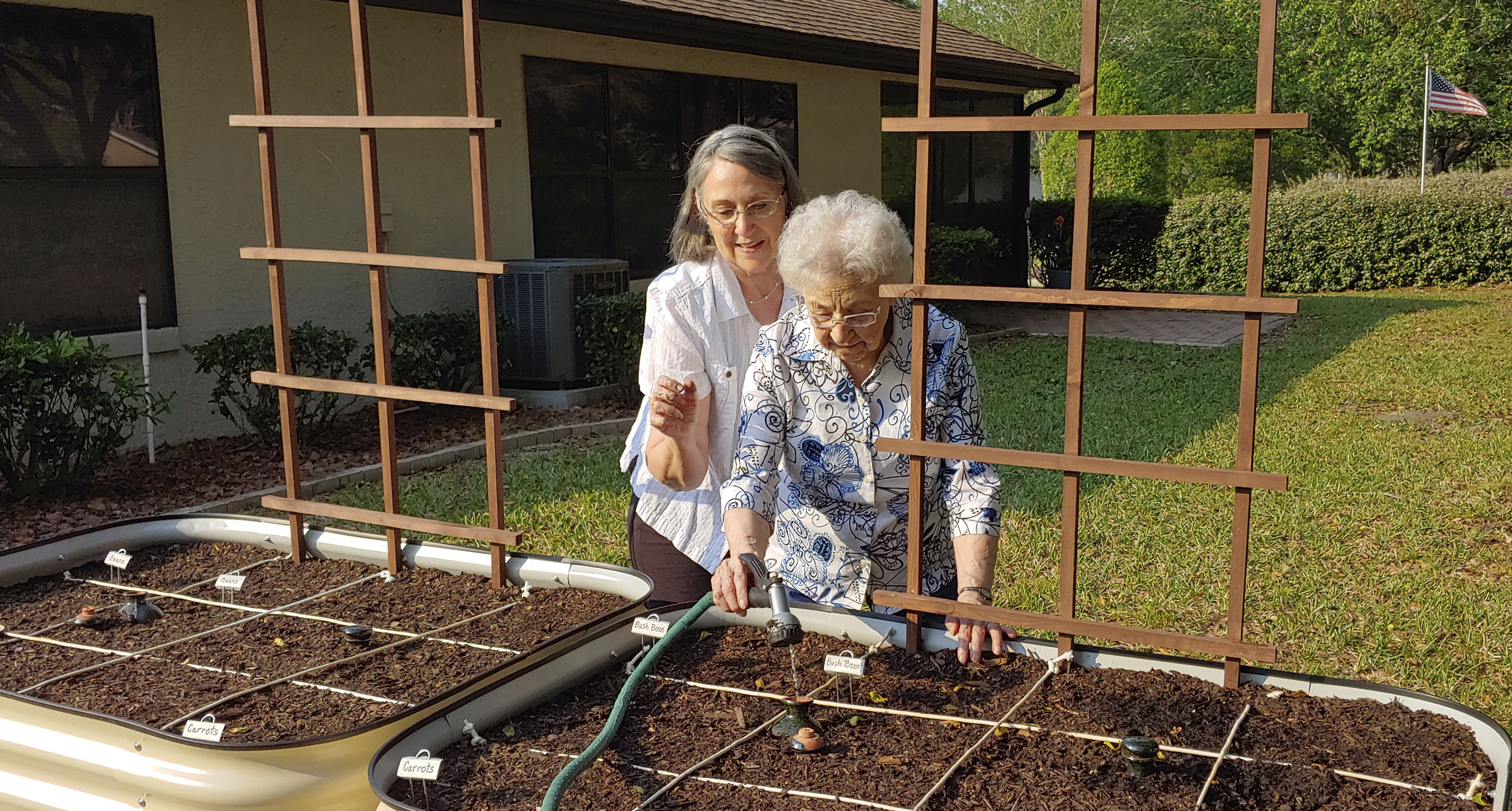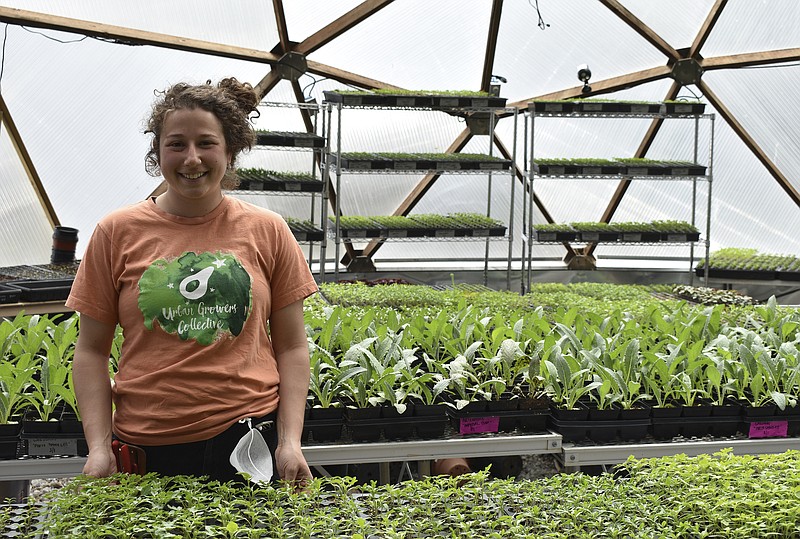During World War I, posters proclaiming "Food will win the war" encouraged Americans to grow victory gardens. A century later, home gardeners are returning to that idea in the fight against a global pandemic.
Backyard gardeners are coming together, mostly virtually, to learn and share stories on how to grow vegetables, fruits and flowers as the novel coronavirus raises fears about disruptions in food supplies and the cost of food in a down economy.
Creating a victory garden now can be, as it was during World Wars I and II, a shared experience during hardship and uncertainty.
"World War I, to me, is a pretty stark parallel," said Rose Hayden-Smith, a historian and author of "Sowing the Seeds of Victory: American Gardening Programs of World War I." "Not only was there a war, but there was an influenza pandemic."
Now, gardeners new and old are getting online and on social media to post pictures of freshly tilled backyards, raised garden beds, seeds germinating under grow lights or flocks of chickens. Facebook groups like Victory Garden 2020 or Victory Garden Over COVID-19 are filling up.
Some of these gardeners are newly unemployed, or working parents stuck at home with bored kids. Others are gardening enthusiasts who never had the time before to delve deep into the hobby. Urban community gardeners are ramping up production to feed families who have lost income and kids who no longer get meals at school.
Jennifer McShane had to close her bar in Brooklyn due to the COVID-19 spread in New York City. She's been eating mostly frozen vegetables and is wary of buying fresh produce from a grocery store. But she knew how to plant herbs in containers on her brownstone's patio, so she picked up some tomato seeds, sowed them indoors and labeled them "Seeds of Hope."
"I can't wait for the plants to come in because I am desperate," said McShane. "The things I am missing are the fresh things."
 This April 10, 2020 photo shows Marshall Mitchell, Urban Farm Assistant at the Urban Growers Collective farm in Chicago. The nonprofit teaches young kids and others to grow vegetables at eight urban farms around the city. While their spring educational programs are on hold due to rules on social distancing, Laurell Sims, the co-founder, said they are still focusing on food production and getting produce to families that need it. (Laurell Sims via AP)
This April 10, 2020 photo shows Marshall Mitchell, Urban Farm Assistant at the Urban Growers Collective farm in Chicago. The nonprofit teaches young kids and others to grow vegetables at eight urban farms around the city. While their spring educational programs are on hold due to rules on social distancing, Laurell Sims, the co-founder, said they are still focusing on food production and getting produce to families that need it. (Laurell Sims via AP)
Emanuel Sferios of Las Cruces, New Mexico, was a self-employed contract worker before the virus, but his work has dried up.
So he borrowed a tiller from a neighbor and dug a 30-by-30-foot garden in his backyard. He filled it with compost and planted lettuce, beets, kale and broccoli. He plans to grow squash, melons, tomatoes and peppers, too. He and his girlfriend found a friend on Facebook who was giving out seedlings.
"It's not like we needed this in order to get groceries," said Sferios. "It's more like, wow, what do I do now? I don't have work and I have all this time on my hands."
A common reason to grow vegetables during WWI was limited food supply. America was sending food to European allies and American troops, explained Hayden-Smith. Victory gardens also were a way to assimilate America's many new immigrants through a patriotic and community-building effort.
"So these gardening posters and food preservation posters would appear in literally dozens of languages," said Hayden-Smith.
By WWII, the federal government started encouraging gardening as good economics after the Depression. And as it looked for healthy young men to draft, the government promoted nutrition as part of the national defense, Hayden-Smith said.
Hayden-Smith sees social-media posts about gardening during the pandemic as a 21st century version of the victory garden poster.
"We don't have poster art, but we have Instagram," she said.
In Chicago, a nonprofit called Urban Growers Collective teaches kids and others to grow vegetables at eight urban farms around the city. While their spring educational programs are on hold due to rules on social distancing, co-founder Laurell Sims said they are still focusing on food production and getting produce to families that need it. The group is selling bags of homegrown vegetables like kale, spinach and scallions.
"We're starting to see prices spike here in Chicago for certain kinds of produce just because it's harder to get it," Sims said.
She said most community gardens right now are closed, but her group is hoping to get them reopened with limits on the number of people allowed to work in them at one time.
"The whole heart of a community garden is a community," said Sims. "When we know that our neighbors are sick, when we know our neighbors are compromised, we're able to help them out."
Gardening skills were once passed on from generation to generation, but farming became more industrialized and people moved away from rural areas. Now there's nostalgia for a connection to the land, including gardening, preserving and cooking at home.
Across the country, stores are selling out of flowers, vegetable plants, seeds, and garden soil and compost. At Burpee Seeds, an online, catalog and retail supplier, business has doubled during the pandemic. George Ball, chairman of Burpee, said this cyclical interest in gardening is tied to the national economy.
"We do really well when the economy is stressed or sort of knocked sideways," Ball said, adding that Burpee also saw an uptick in seed purchases during the Great Recession and the stock market crash in 1987.
Brenda Flowers, in Crystal River, Florida, built a tall raised garden for her 96-year-old mother, Lorraine, who grew up in the Great Depression and was among the many women who went to work in factories during World War II to replace the men who were fighting overseas.
"Wouldn't that be so cool if she could go out and just rip off some lettuce leaves and pull up some radishes and some carrots and kale, just like she did when she was younger?" said Flowers.
Before the coronavirus, Bettie Egerton wanted to revive victory gardens in her community of McMinnville, Oregon, to address climate change. She handed out victory garden signs for people to put in their gardens, and encouraged people to avoid buying produce that was trucked in from thousands of miles away. Now, Egerton says the idea of a victory garden has added resonance.
"It's like victory over all kinds of things," she said.
 In this April 12, 2020 photo, Brenda Flowers, left, and 96-year-old Lorraine Tyree, water their plants in Crystal River, Fla. Backyard gardeners are coming together, mostly virtually, to learn and share stories on how to grow vegetables, fruits and flowers as the novel coronavirus raises fears about disruptions in food supplies and the cost of food in a down economy. (Ed Flowers via AP)
In this April 12, 2020 photo, Brenda Flowers, left, and 96-year-old Lorraine Tyree, water their plants in Crystal River, Fla. Backyard gardeners are coming together, mostly virtually, to learn and share stories on how to grow vegetables, fruits and flowers as the novel coronavirus raises fears about disruptions in food supplies and the cost of food in a down economy. (Ed Flowers via AP)
